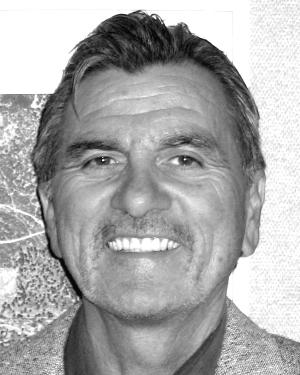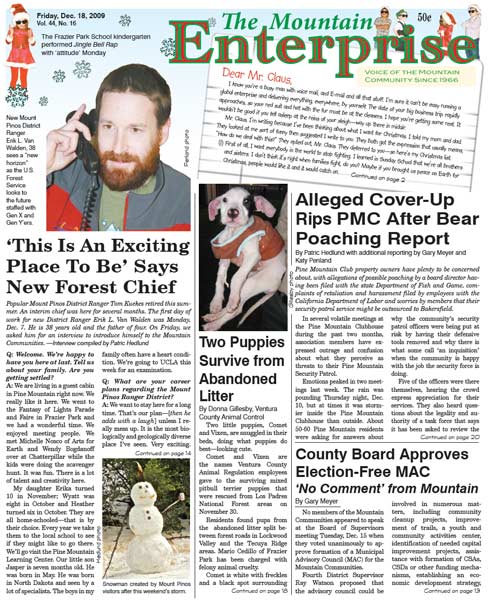
Lee Benavidez
By Patric Hedlund and Gary Meyer, with additional reporting by Katy Penland
Pine Mountain Club property owners have plenty to be concerned about, with allegations of possible poaching by a board director having been filed with the state Department of Fish and Game, complaints of retaliation and harassment filed by employees with the California Department of Labor and worries by members that their security patrol service might be outsourced to Bakersfield.
In several volatile meetings at the Pine Mountain clubhouse during the past two months, association members have expressed outrage and confusion about what they perceive as threats to their Pine Mountain Security Patrol.
Emotions peaked in two meetings last week. The rain was pounding Thursday night, Dec. 10, but at times it was stormier inside the Pine Mountain Clubhouse than outside. About 50-60 Pine Mountain residents were asking for answers about why the community’s security patrol officers were being put at risk by having their defensive tools removed and why there is what some call ‘an inquisition’ when the community is happy with the job the security force is doing.
Five of the officers were there themselves, hearing the crowd express appreciation for their services. They also heard questions about the legality and authority of a task force that says it has been asked to review the operational guidelines for the patrol.
The task force, with John Dilibert as its spokesperson, says it is charged with “reviewing security force procedures and services,” but the task force itself was not constituted according to association rules.
On Saturday, at the second member meeting on the subject, about 128 people crowded into the Condor Room. Of those, half walked out, many with heated comments, when they said Dilibert was not willing to address “the real issues.” But what are “the real issues”?
‘If it ain’t broken…”
At the Thursday, Dec. 10 meeting, a loudly expressed sentiment about the security force was, “If it’s not broken, don’t fix it.” Residents also asked what the “trigger” was for this review, and why defensive batons and pepper spray had been removed from the security officers.
In addition, the security force said they are currently unable to answer most of the calls they had responded to in the past because the task force and management has left them in limbo regarding authorization to fulfill their mission. This also deprives the members of services they have come to rely upon.
Patrol Chief Rick Wastaferro said he and his officers want their tools back. He said each of the officers had been trained and certified with licensing through the State of California.
Though it appears many operational decisions had already been made behind the scenes, John Dilibert was energetic in putting the public meeting together after Mar Preston asked the PMCPOA Board of Directors in November’s open session for greater member input on the issue.
Dilibert said he believes that a policy of continual training was advisable for all “use of force” tools. Security guards replied that they had been seeking training updates for years and had been denied.
Members of the task force at the meeting included Scott Robinson (L.A. County Fire Department and PMCPOA director), John Dilibert (Burbank City Police Department and director), Maurice Tondreau (retired California Highway Patrol officer and Pine Mountain resident). Also sitting at the front table was PMCPOA General Manager Jerry Fossler, Dick Welles (a director) and Lee Benavidez who is the current chairman of the PMCPOA Board. All other PMCPOA directors were in the audience.
Tondreau said he wanted to be clear that although he had been asked to serve on the task force, he had nothing to do with removing the patrol’s defensive weapons. Dilibert also indicated that he felt the tools should be returned to the security force, but with updated training.
What Was the Trigger?
All agreed that there had been no incidents in over 15 years regarding improper use of tools or procedures in regard to the security force—which returned the questions to how exactly all these changes had come to pass so suddenly and with no public discussion.
The members refused to be diverted to other issues until the panel answered. At last, General Manager Jerry Fossler revealed that he had talked with the PMCPOA insurance carriers and legal counsel about the force’s tools. In a seemingly contradictory explanation, he said that the insurance company had replied that they had no concerns at all about patrol carrying nightsticks and pepper spray. He said that the attorney, Len Siegel, told him that there could be a liability “if something happened.” On that basis he said he had ordered that the tools be removed.
But why the sudden focus on the security force?
Community Support
A notable number of former law enforcement officers were among the members who attended the meetings. Four of them spoke up about troubling aspects of the recent decisions.
Gary Biggerstaff, who mentioned being responsible for aspects of law enforcement during the 1984 Olympics in Los Angeles, said he considered himself an expert on law enforcement and security policy. He read a statement which he said was “pulling the plug on the grenade” in representing the community’s concerns.
He praised the security force as “always courteous, quick responders and proactive problem solvers.” He said their activities are often preventive, which “cuts down on liabilities to the association.”
He said that officers living locally are a great asset because they are part of the community and nearby for call in a fire or disaster emergency.
He said they are “fully trained in defensive tools such as mace and batons,” and that removing these tools from the officers was creating a larger liability risk for the community than it eliminated. He drew a scenario of an officer responding to a call for a loose dog in which that officer incurred an injury because security personnel had no baton with which to protect themselves if the dog attacked. The POA would be liable for the officer’s injuries.
“Are we happy with what we have?” Biggerstaff asked. The question drew a response of “Yes!” and applause from the crowd as the committee sitting at the table in front looked on with discomfort. He said that trying to “outsource” security was a bad idea. “We should return their defensive tools immediately,” he said.
“In 15 years, there has never been a case brought against the association because of the security patrol. Why? It is because of good personnel selection, good supervision and good procedures,” he said. In fact, he added, over a million dollars in suits against the association had been filed because of bad decisions by directors and managers in the past, “so if you really want to cut the costs of liability….[and here he left a pregnant pause]… well, you do the math….” There was general laughter in the hall as directors, former directors and members understood Biggerstaff was suggesting that perhaps they should ‘get rid of the directors.’
After the meeting, The Mountain Enterprise asked PMCPOA director and board chair Lee Benavidez whether the officers would have their equipment back within a week, by December 18. He said, “Yes they will, and they will have training too.”
Cutting Through the Smoke
But what really brought about all of the activity to re-evaluate procedures within PMC Patrol?
Did one comment of concern from a lawyer, plus a comment of no concern from an insurance company really cause the creation and mobilization of a task force, the removal of defensive tools from the security patrol and all the talk about “outsourcing” the patrol’s services?
Cover-Up
Since mid-June, talk of “coverup” and retaliation, harassment and gag orders have whirled through the village. Anonymous letters have been posted alleging “corruption” by directors of the Pine Mountain Club Property Owners Association. Still, there is a vagueness to the charges.
Much of the anger in the community seems to center on alleged actions by Lee Benavidez as a private individual which implicated the security force, resulting in the security chief feeling compelled by state law and his own operating procedures manual to turn information over to a state agency for investigation in order to protect the association from liability.
Following those events, what some perceive as attacks on the security force began.
Seeking Facts
In order to piece together the facts that we can place on the record at this time, The Mountain Enterprise filed public records requests with state agencies, interviewed PMC directors, numerous residents, state labor board commissioners, Department of Fish & Game (DFG) investigators, an attorney and others.
Some of those in Pine Mountain with whom we spoke said they feel vulnerable. Some said the manager has been overbroad and capricious in ordering them, with threats, to “keep quiet” about issues and events that took place outside of their workplace.
Where it Started
In documents filed with California Department of Fish and Game (DFG) in June— given subsequently to members of the PMCPOA Board of Directors (titled ‘Mil Potrero Hwy Bear Incident’)—and confirmed in an interview with Department of Fish and Game Lieutenant Thomas Stenson on December 14, The Mountain Enterprise has confirmed that a bear was struck and killed by a commercial waste management truck at 7:40 a.m., June 9, 2009 on Mil Potrero Highway, just east of Yellowstone Drive, on the edge of Pine Mountain Club’s boundary.
- PMC Patrol responded at 7:47 a.m. to remove the animal from the roadway to prevent a traffic hazard for morning commuters. The bear was moved about 12-15 feet from the roadway. CHP responded a few minutes later and was informed.
The following series of events include items from that report and on-the-record interviews with first person witnesses.
- About 45 minutes after the incident, Joey Goulart of Pine Mountain, who was driving a big rig in Ontario, CA at the time, was notified by his wife that the bear had been struck. “I called Lee [Benavidez]. I said someone from Mountainside Disposal hit a bear. He wanted to know specifically where it was, and I told him ‘by Yellowstone.’
“He called me back about noon. He said he had gone over there to see it, then went back [to work]. He said he wanted to go back to pick it up. He said he was going to get the bear and have a ritual, take its claws and then take it to some indian ground and have it buried. He was letting me know he wanted the claws. The only way was to cut the paws off with a chainsaw.”
- Kim Wickers, who works at the Pine Mountain General Store, was preparing to close up at 7:55 p.m. on Tuesday, June 9 when she received two calls from customers asking her to stay open a few minutes longer. One was from Lee Benavidez, “who called and said he needed to come in and get some salt. So he came in at 8:07 p.m. and he was excited. He said, ‘Do you know about the bear that was hit on the road? I’m going to get the claws off of him and give him a proper burial.’ He said he was going to use the salt to cure the paws that he was taking off. And he bought four containers of ordinary salt and left. While he was telling me this I knew that possession of bear claws is illegal in state of California. You are not allowed to use them to make ‘novelty items.’”
The report to Fish and Game continues:
- On the evening of June 9 PMC Patrol officer Brian Adams received a call from PMC Director Lee Benavidez, who requested that the officer assist him in loading the bear into his truck. Adams declined to assist. Within 20 minutes Mr. Benavidez called again and stated that the bear was gone, coyotes had taken it. The officer went to the location and did not observe signs of coyote activity. All that was seen was signs of human foot traffic.
- [Security Chief Rick Wastaferro] was informed of the request the morning of June 10. He called Department of Fish and Game “in search of answers to Native American rights in relation to possession of game animals. I was informed that off of a reservation, this is not allowed. I requested that Game Warden Gary Densford contact me.”
- Late afternoon, June 10, “[Security Chief Rick Wastaferro] was told by Director of Administration for Pine Mountain Club, Lori McChesney, that General Manager Jerry Fossler stated that Mr. Benavidez claims to have buried the bear. I explained the contradiction of answers by Mr. Benavidez in that he called [the officer] with a different story line.”
- The evening of June 10, [Security Chief Rick Wastaferro] “received a phone call at my residence in which Suzy and Joey Goulart stated that Mr. Benavidez told them he took a chainsaw and removed the paws and intends to make a necklace of the claws. He also went to Pine Mountain Store and purchased four pounds of [salt]. We know that salt can be utilized in the tanning and preservation of a hide.”
- On June 12, 2009 at 4:40 p.m. the Fish and Game investigator was provided with a series of names and phone contacts for use in his investigation. He took samples of blood and fur from the roadway.
DFG Lt. Stenson explains that “You cannot possess a bear or bear parts without a hunting license and a bear tag…the mere possession of it is poaching.
“If I said ‘I’d like the bear skin,’ I can’t have it. If we had somebody that said ‘I saw him pick it up and take it,’ we could have gotten a search warrant. It has to be a credible person willing to testify.” Stenson said that poaching is a misdemeanor, punishable by up to $1,000 and up to one year in county jail.
Stenson said on December 14 that “If someone observed or helped another person move the bear from the roadside,” he wants to hear from them. The number to call if you have a tip is (888) 334-2258.
Stenson said he doesn’t believe a person would be arrested for merely picking up the bear or responding to a request from someone else to help move it. He says he is interested in the person who ended up taking the bear—not someone who may have been talked into helping. “If someone just picked it up, they didn’t violate any laws. So I wouldn’t recommend arresting them for that,” he said.
Meanwhile, association employees were admonished again to “keep quiet.” They were brought into an “all-hands” meeting and told that the unemployment rate in California had reached 12 percent, then told they worked “at will” and could be terminated at any time. They were told to sign documents agreeing not to divulge information about their workplace. Still, there are federal and state laws that protect an employee who reports a crime.
On December 15, it was confirmed with the Retaliation Complaint Unit of the Division of Labor Standards that at least one complaint had been received in November from a PMCPOA employee.
In an interview with Marcia Rarick and Angeline Ratekin, both Senior Deputy Labor Commissioners with the State of California, The Mountain Enterprise asked what the penalties could be for violating laws prohibiting harassment or retaliation against employees. They stated that Section 1102.5 of the Labor Code prohibits an employer from making, adopting or enforcing any rule, regulation, or policy preventing an employee from disclosing information to a government or law enforcement agency, where the employee has reasonable cause to believe that the information discloses a violation of state or federal statute, or a violation or noncompliance with a state or federal rule or regulation. They referred us to sub-section F, which states, “In addition to other penalties, an employer that is a corporation or limited liability company is liable for a civil penalty not exceeding ten thousand dollars ($10,000) for each violation of this section.”
Rarick and Ratekin were careful not to discuss any particulars of the complaints filed against PMCPOA, Inc.
On December 10 The Mountain Enterprise asked Lee Benavidez about taking the bear. “It isn’t true. There was no bear,” he said emphatically. We asked if he had purchased four pounds of salt and told people he was going to get the bear: “No! My wife was going to make ice cream that night,” he said. We asked, “What about reports you asked someone else for help?” He said, “I didn’t ask anybody to help.” We asked if he had talked with an investigator from Fish and Game, “No, I haven’t talked with Fish and Game…People make up things up here.”
On the morning of Wednesday, Dec. 16, we spoke with Benavidez again, discussing the events that triggered the review of the Pine Mountain Security Force.
Again, we asked about purchase of the salt.
This time, he admitted buying the salt and taking it for use with the dead bear: “I don’t know what these people are saying. If anything, it would have been a proper ceremony to honor the bear. I’m from the Bear Clan myself. It was going to be a blessing. Yeah, but there was no bear to be found.”
Several members of the PMCPOA Board of Directors said they plan to make statements at the Saturday, Dec. 19 meeting at 10 a.m.
This is part of the December 18, 2009 online edition of The Mountain Enterprise.
Have an opinion on this matter? We'd like to hear from you.


